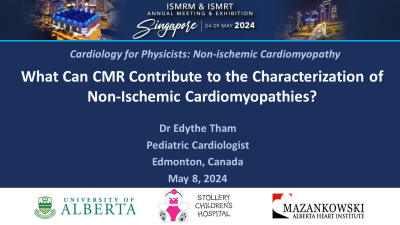Sunrise Course
Cardiology for Physicists: Non-Ischemic Cardiomyopathy
ISMRM & ISMRT Annual Meeting & Exhibition • 04-09 May 2024 • Singapore

| 07:00 |
Non-Ischemic Causes of Decreased Heart Function: Infiltrative
Processes, Autoimmune Reactions, Inflammation & Drug Reactions
Tevfik Ismail
Keywords: Cardiovascular: Cardiovascular, Cardiovascular: Cardiac, Cardiovascular: Myocardium Non-ischemic cardiomyopathies constitute a heterogeneous group of conditions characterized by morphological and functional ventricular abnormalities not due to coronary disease or its sequelae. Pragmatic classification of these disorders is based on observable morphofunctional traits (ventricular size, function, wall thickness, tissue characteristics, electrical abnormalities) and is combined with clinical, genetic, and laboratory/histopathologic data to arrive at a precise diagnosis. Inflammatory cardiomyopathies are defined as myocardial inflammation (myocarditis) associated with cardiac remodeling or dysfunction. Etiology has been crudely classified as “inherited” or “acquired”, however, it is increasingly recognized that conditions hitherto regarded as acquired can also have a genetic contribution or basis. |
|
| 07:30 |
 |
What Can CMR Contribute to the Characterization of Non-Ischemic
Cardiomyopathies?
Edythe Tham
Keywords: Cardiovascular: Cardiac, Cardiovascular: Cardiac function, Cardiovascular: Myocardium CMR has developed beyond anatomical imaging to provide functional assessment and myocardial tissue characterization providing a powerful diagnostic tool in cardiomyopathies. Fibrosis is the final common pathway of myocardial diseases from a variety of insults and is associated with declining ventricular function. Late gadolinium enhancement can detect focal myocardial fibrosis; while T2 mapping (edema), T1 mapping and extracellular volume (diffuse fibrosis), provide quantitative parameters that are used in the diagnosis, management and follow up of patients with non-ischemic cardiomyopathies. A shift towards these imaging parameters should provide a non-invasive serial marker to assess response to treatments and may predict outcome. |
The International Society for Magnetic Resonance in Medicine is accredited by the Accreditation Council for Continuing Medical Education to provide continuing medical education for physicians.